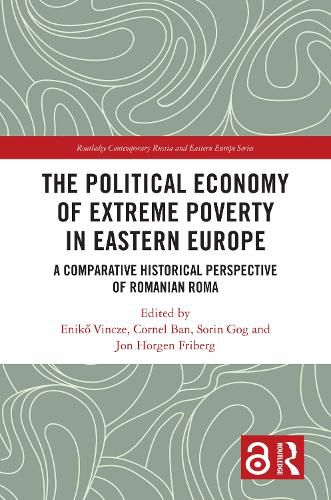Readings Newsletter
Become a Readings Member to make your shopping experience even easier.
Sign in or sign up for free!
You’re not far away from qualifying for FREE standard shipping within Australia
You’ve qualified for FREE standard shipping within Australia
The cart is loading…






This book examines the creation of extreme poverty in Eastern Europe, focusing on Romanian Roma, through a comparative historical perspective on its roots and the socio-economic and political mechanisms that have shaped it in labor, housing, and migration.
This interdisciplinary book explores the (re)production of extreme poverty among the Roma across different political economy regimes. Chapters engage in comparative historical analysis across several disciplines and integrate perspectives steeped at the national level of analysis with those dwelling intensively on a single context. Focusing on the processes of manufacturing poverty among Roma in Romania, the chapters cover empirical information about the historical transformations of the economic situation of the Roma in Romania from the 19th century to the present, about global, national, and local processes of industrialization, deindustrialization, and reindustrialization impacting poverty among the Roma in the past seven decades, and about Roma people's current labor positions, housing conditions, and migration practices in distinct geographies from Romania to Norway.
The book situates Roma poverty research in a Central and Eastern European context by highlighting its connections with analytical approaches to poverty and institutional policy visions about poverty eradication. It will be of interest to researchers studying Central and Eastern Europe, political economy of socialism, political economy of capitalist transformations, poverty studies, welfare and housing regimes studies, and labor and migration studies.
The Open Access version of this book, available at http://www.taylorfrancis.com, has been made available under a Creative Commons Attribution-Non Commercial-No Derivatives (CC-BY-NC-ND) 4.0 license.
$9.00 standard shipping within Australia
FREE standard shipping within Australia for orders over $100.00
Express & International shipping calculated at checkout
This book examines the creation of extreme poverty in Eastern Europe, focusing on Romanian Roma, through a comparative historical perspective on its roots and the socio-economic and political mechanisms that have shaped it in labor, housing, and migration.
This interdisciplinary book explores the (re)production of extreme poverty among the Roma across different political economy regimes. Chapters engage in comparative historical analysis across several disciplines and integrate perspectives steeped at the national level of analysis with those dwelling intensively on a single context. Focusing on the processes of manufacturing poverty among Roma in Romania, the chapters cover empirical information about the historical transformations of the economic situation of the Roma in Romania from the 19th century to the present, about global, national, and local processes of industrialization, deindustrialization, and reindustrialization impacting poverty among the Roma in the past seven decades, and about Roma people's current labor positions, housing conditions, and migration practices in distinct geographies from Romania to Norway.
The book situates Roma poverty research in a Central and Eastern European context by highlighting its connections with analytical approaches to poverty and institutional policy visions about poverty eradication. It will be of interest to researchers studying Central and Eastern Europe, political economy of socialism, political economy of capitalist transformations, poverty studies, welfare and housing regimes studies, and labor and migration studies.
The Open Access version of this book, available at http://www.taylorfrancis.com, has been made available under a Creative Commons Attribution-Non Commercial-No Derivatives (CC-BY-NC-ND) 4.0 license.